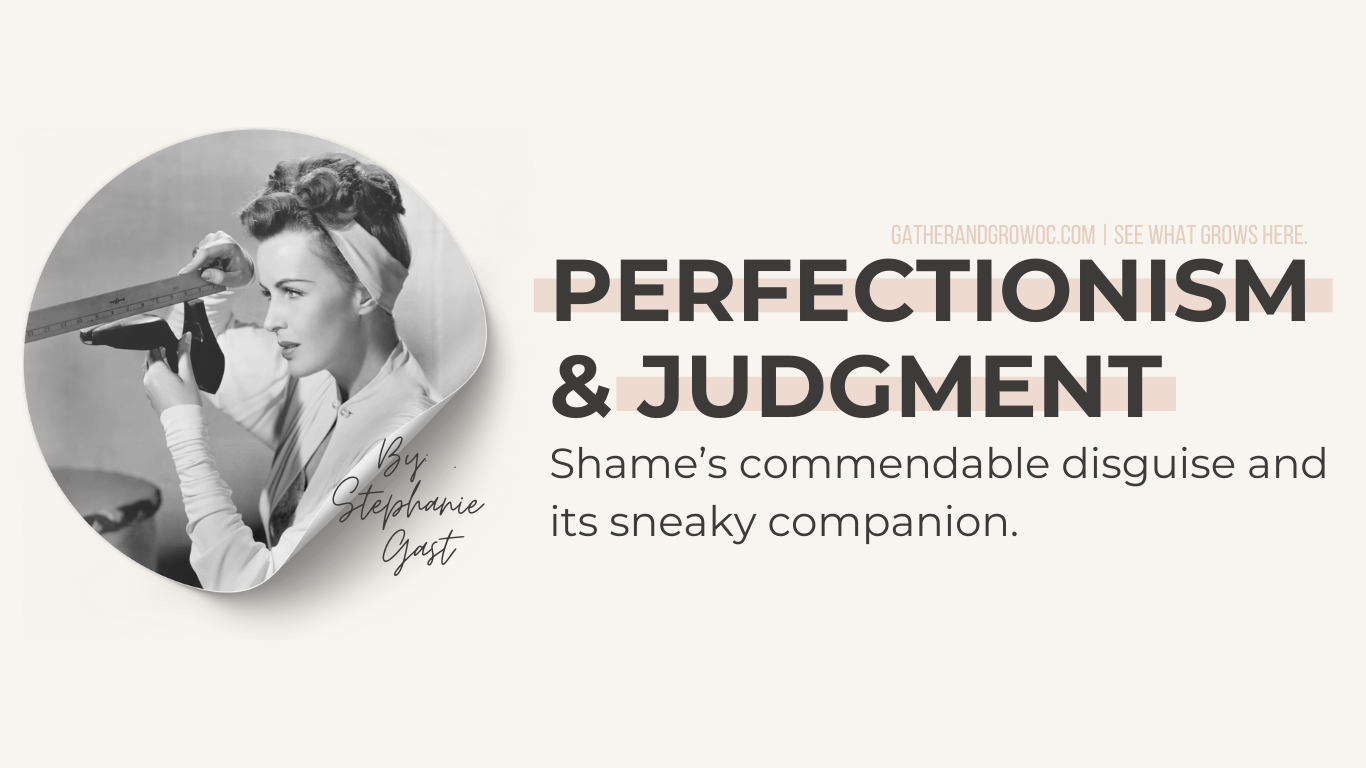Perfectionism & Judgment: Shame's commendable disguise and its sneaky companion
Perfectionism & Judgment
Shame’s commendable disguise and its sneaky companion.
I’ve struggled with perfectionism my entire life. For me, it has been a scheming motivator underneath my high-achieving and ambitious nature. One of the main ways it started to make itself painfully known to me was through my black and white thinking; all or nothing.
High Expectations = High Stakes = High Mistakes
Perfectionism is highly praised, applauded, accepted, and even encouraged. Perfectionism is regarded for its attention to detail, incredible work ethic, honorable dedication, impeccable rightness, constant productivity, immaculate results, consistent high performance, pristine presentation, and remarkable success.
But what if you missed a really important detail on a project and only noticed it after you submitted it?
What if you are multitasking and fall short of a crucial deadline?
What if you are sick or burned out and struggling to convince yourself to use one of your many sick days?
What if you get feedback about a shortcoming or an area of growth from a friend or colleague?
What if you want to enjoy a hobby or a leisurely activity but it doesn’t feel like a productive use of time?
What if you put in your best effort and the results don’t meet the vision you expected or built up in your head?
What if you accidentally hurt someone's feelings, sang the wrong note, or missed a step when walking in front of other people?
What if you don’t look as put-together and attractive when someone you like sees you in public?
What if you are denied or rejected from an opportunity or person you admire?
How do you feel about yourself then? If after reading those you imagined yourself in one or more of those scenarios wincing, cringing, flushing, crying, or all of the above, then you might want to continue reading.
My Relationship with Perfectionism
Perfectionism ingrained a sense of urgency in me. A hyperfixation on right and wrong. Good and bad. With a blatant disregard for nuance and a lack of consideration for complexity.
Perfectionism robbed me of years of silliness, fun, messiness, laughter, funny-to-look-back-on memories, new experiences, self-trust, “happy accidents” as Bob Ross would say, joy and love.
Perfectionism hijacked the authority over my own thoughts and I developed excruciatingly distressing Obsessive Compulsive Disorder (OCD). A silent war I’ve battled my whole life underneath the outward appearance of having it all together. I had already been praised for my high-functioning mask so it was an invisible struggle that I learned to fight quietly. Meanwhile, it cost me many sleepless nights, days I could have spent outside or making art, peace in the present, and, almost, my 8-year-strong relationship.
For a long time, I didn’t realize not everyone’s brain worked the same as mine. I thought it was normal. Normal to have a ruthless judicator within my mind scrutinizing every choice I make. Normal to have a scary voice that told me I would die if I didn't finish reading a book page by a certain time when I was a child. Normal to have a looming ominous feeling that something bad would happen if my clothes didn’t fit quite right. Normal to fear life or death with any decisions that could be life-changing (or at least seemed that way.) Normal to feel like a bad person, a fraud, an imposter anytime I make a mistake or experience dichotomy. Normal to ruminate tirelessly and spend hours researching to keep fear at bay.
What I’ve learned throughout my life and through my background in psychology and counseling, is that perfectionism is a coping mechanism to ease or prevent shame
If you believe that mistakes are bad, shame.
Perfectionism says never make a mistake.
If you believe you’re messed up for feeling two contrasting things at once, shame.
Perfectionism says something is wrong.
If you believe distress or discomfort means you’re bad, shame.
Perfectionism says always be right.
If you believe not knowing in the face of uncertainty is bad, shame.
Perfectionism says you should always know what's best.
If you believe that flaws make you defective, shame.
Perfectionism says, well, be perfect.
Perfectionism tries to beat shame to the punch.
It tries to avoid shame at all costs. But where does this shame come from? I used the word believe intentionally as it all stems from what we believe to be true. I had no idea other people didn’t carry the belief that making mistakes was bad and shameful. That having flaws or being messy didn't mean anything shameful or bad about you. It's all about the beliefs we carry, where we learned them, how we learned them, and what those beliefs attach to.
When I read the following statement, it changed my entire perspective of perfectionism and its relationship to shame.
Shame is when we aren’t giving ourselves permission to be human.
For me, this was a game-changer for my approach to self-compassion and self-love.
Human. Huh? I thought, “I’ve been shaming myself for my.. humanness?” No wonder this has felt so awful, I’m not giving myself grace and compassion for being a human.”
Humans are capable of being messy, imperfect, flawed, unattractive, unflattering, disappointing, frustrating. But humans are also capable of being incredible, beautiful, heart-warming, comforting, funny, kind, loving, and so much more.
Want to find out where your sneaky pockets of shame are?
Let's talk about judgment.
When you are hypercritical of yourself, you can also be more hypercritical of other people.
The expectations and standards you hold yourself to can be the ones you expect and hold others to as well. The beliefs and judgments you hold for yourself can be conveniently projected onto other people who display certain qualities or characteristics. How we react to another person in this context can reveal something about how we respond to ourselves behind closed doors.
“When you understand that every opinion is a vision full of personal history, you will begin to understand that every judgment is a confession” -Nikola Tesla
Being judgmental, critical, or agitated by someone else who is minding their own business and living their best life without doing anything intentionally harmful, can provide an opportunity for deep self-reflection with rich rewards.
Judgment serves to disconnect, to separate, to create space or distance from that which is being judged. It was one of the ways my OCD tried to cunningly pull focus from the true emotions that needed my attention but ironically, to its demise, led me straight to it.
When you let yourself sit with your judgment or irritation, it will often illuminate something you shame within yourself. It points to a place where you don't believe that you are worthy of love and belonging if you were to express that yourself. Other people act as a mirror whose blinding reflection can be quite jarring to the ego so it will whip out judgment as its main defense saying “Get me as far from that thing as possible because I would be completely unlovable if I got anywhere close to that.”
“That person is SO loud!”
Do you shame yourself for how much space you take up in a room?
“Wow I can’t believe she wore that out of the house.”
Do you shame yourself for experimenting and playing with your self-expression?
“Oh that doesn't look very good, I could have made it better myself.”
Do you shame yourself if your best efforts don't meet your high standard and only try something unless you know you’ll be good at it?
“Did you notice so and so left their job? Seems like an irresponsible choice to me!!”
Do you shame yourself if you take a risk or make a bold move that may or may not succeed?
“That is SO embarrassing, they should never try doing that again.”
Do you shame yourself when you don’t like the outcome or make a mistake when learning something new?
“What they created is just not that good, they shouldn't even bother.”
Do you shame yourself when you express yourself freely and imperfectly just for the fun of it?
“Who do they think they are? They are coming off SO egotistical.”
Do you shame yourself for loving yourself and walking through life with unapologetic confidence?
How about them apples?! But seriously, here is the important part!
Did you see yourself in any of those or find yourself recounting a similar scenario? How do you meet yourself?
Are you embarrassed? Meet yourself with acceptance for your humanness.
Are you annoyed? Meet yourself with patience for your humanness.
Are you angry? Meet yourself with humility for your humanness.
Are you ashamed? Meet yourself with love for your humanness.
No shame for any of these responses! You are human and sometimes we fall into this ego-protecting judgmental trap. Nobody is perfect. You wouldn’t want to be anyway.
Mistakes lead to learning.
Failures lead to creativity.
Disappointments lead to redirection.
Embarrassments lead to graciousness.
Feedback leads to perspective.
Imperfections lead to uniqueness.
Discomfort leads to growth.
Unintended results lead to unexpected outcomes.
Perfectionists think control will keep them safe from shame. But more often than not, it will keep all the aspects that make life exciting, memorable, and worth living at bay. You, me, and all of us are imperfectly perfect.
Sincerely,
Stephanie







